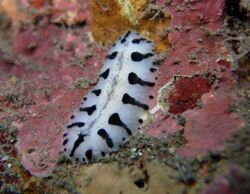Biology:Phyllidiopsis loricata
| Phyllidiopsis loricata | |
|---|---|

| |
| Phyllidiopsis loricata | |
| Scientific classification | |
| Domain: | Eukaryota |
| Kingdom: | Animalia |
| Phylum: | Mollusca |
| Class: | Gastropoda |
| Subclass: | Heterobranchia |
| Order: | Nudibranchia |
| Suborder: | Doridina |
| Superfamily: | Phyllidioidea |
| Family: | Phyllidiidae |
| Genus: | Phyllidiopsis |
| Species: | P. loricata
|
| Binomial name | |
| Phyllidiopsis loricata (Bergh, 1873)[1]
| |
Phyllidiopsis loricata is a species of sea slug, a dorid nudibranch, a shell-less marine gastropod mollusk in the family Phyllidiidae.[2]
Distribution
This species was described from Tahiti. It has been reported from the Great Barrier Reef, Timor Sea (northern Australia), Guam, the Marshall Islands and Enewetok Atoll.[3] Specimens from Réunion in the Indian Ocean may be a different species.[3]
Description
This nudibranch has a white dorsum with rounded black spots in a single row along both sides of the body, with a spot at the front, in front of the white rhinophores, and a similar spot at the back of the mantle. It is a moderately large Phyllidiid, growing to about 40 mm in length. It is similar to Phyllidia scottjohnsoni but that species has black spots along the midline of the back.[3] It is possible that there are several undescribed species with similar coloration.[4]
Diet
This species feeds on a white sponge.[5]
References
- ↑ Bergh, L.S.R., 1873. Neue Nacktschnecken der Sudsee, Malacologische Untersuchungen. Journal des Museum Godeffroy, Hamburg 2: 66-96.
- ↑ Bouchet, P. (2015). Phyllidiopsis loricata (Bergh, 1873). In: MolluscaBase (2015). Accessed through: World Register of Marine Species on 2016-11-13.
- ↑ 3.0 3.1 3.2 Rudman, W.B., 1999 (August 1) Phyllidiopsis loricata (Bergh, 1873). [In] Sea Slug Forum. Australian Museum, Sydney.
- ↑ Johnson, S. & Johnson, J. (2016) Phyllidiopsis loricata Kwajalein Underwater.
- ↑ Pittman, C. & Fiene, P. (2016). Phyllidiopsis loricata Sea Slugs of Hawaii.
Wikidata ☰ Q14094843 entry
 |

